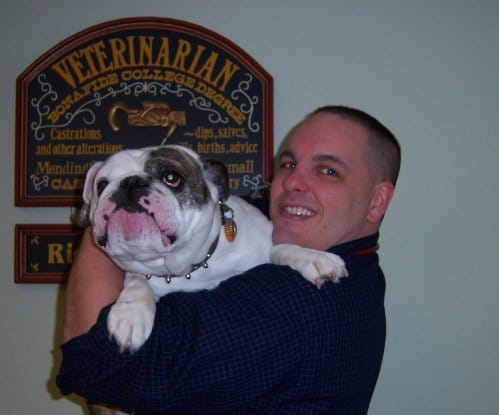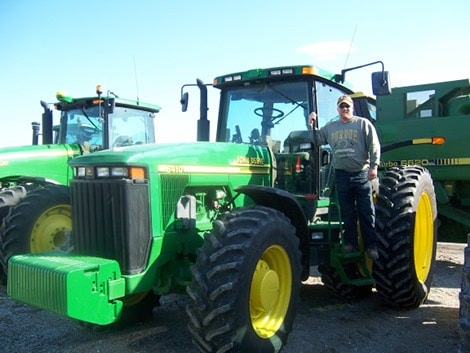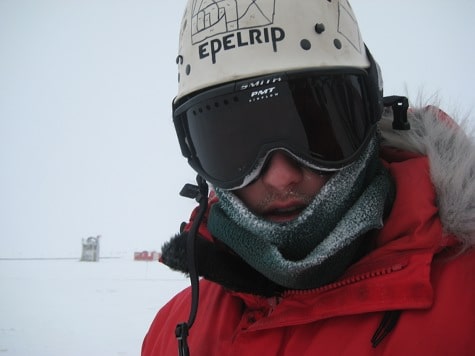
Once again we return to our So You Want My Job series, in which we interview men who are employed in desirable jobs and ask them about the reality of their work and for advice on how men can live their dream.
When man’s best friend gets sick, veterinarians like Richard McAroy are the ones who are there to get them back on their paws again. Dr. McAroy is a vet in New Hampshire and fixes up dogs and lots of other four (and sometimes eight) legged creatures. Thanks Richard for providing us with this thoroughly interesting and enjoyable interview.
1. Tell us a little about yourself (Where are you from? How old are you? Describe your job and how long you’ve been at it, ect).
I’m 41 years old and from Harrah, Oklahoma originally. I graduated from Oklahoma State University College of Veterinary Medicine in 1999 and I’ve been in private practice for ten years. 8 years ago I purchased my own small animal hospital in Hudson, New Hampshire. I’m considered a “solo vet,” meaning I’m the only full-time doctor in the practice (although I have a part-time veterinarian who works one day per week). I am a small animal/exotic veterinarian… I see mostly dogs and cats, but also turtles, guinea pigs, hamsters, snakes, and the occasional tarantula. I am not a fan of spiders. I do the exam wearing latex gloves and use a wooden stick to prod the spider. If they move, they’re probably healthy.
My professional interests are medicine and diseases specific to English Bulldogs (money pits, don’t buy one… that’s advice everyone should heed), bioterrorism response and training, and ophthalmology. I am a certified Foreign Animal Disease Response Training Officer and enjoy helping police K9 working dogs.
2. Why did you want to become a veterinarian? When did you know it’s what you wanted to do?
I’ve always felt kind of guilty about this… most of my classmates had always wanted to be a veterinarian for as long as they could remember. I wanted to be an astronaut. However, after a short stint in the Air Force I learned that I had asthma and not-so-great eyes and that my chances of going to the moon were slim, so I went to school and studied biochemistry. I went to work as a State Police dispatcher while I attended class full-time. I had always thought that being a veterinarian entailed a lot of farm work, but after doing some research, I realized that veterinarians are EVERYWHERE, not just on the farm. There are military veterinarians who do everything from working dog medicine to meat inspection, all the way up to veterinarians who deploy with the Army Special Forces and help indigenous people with their public health and livestock. There are federal veterinarians who are at the leading edge of biological terrorism response. There are also veterinarians who work for NASA, and one veterinarian who is a regular space shuttle mission specialist. A fellow New Hampshire resident, I might add.
I applied to veterinary school during my senior year of college. I had basically decided to be either a veterinarian or stay in law enforcement and become a detective. When I got my letter of acceptance into veterinary school, I sat down with my boss, the Chief, and asked him what he thought I should do. He said, “Sure, I’ll make you a detective when you graduate, if that’s what you want. But you know… I’ve always wanted to be a vet.” I called the school five minutes later and joined the incoming OSU CVM Class of 1999.
3. A lot of men are familiar with the process of becoming a people doctor (college, MCAT, med school, residency…), but don’t know much about what it takes to become a vet. What is involved in the process and how long does it generally take?
Becoming a veterinarian is very similar to becoming a human MD. First you have 4 years of undergraduate college to complete… although any major can apply, there are a certain number of prerequisite classes you must take as background science studies. During undergrad, you have to take organic chemistry I and II with lab, biochemistry and lab, and zoology. Genetics was one of the classes required for applying to Oklahoma State, and that was a seriously hard course that I just barely passed. By the time you have planned out the prerequisites required, you are very close to having a bachelor’s degree in science. I took a few extra classes and got my BS in Biochemistry.
Generally you apply to veterinary school during your junior year of college. The application process consists of school-specific paperwork, interviews, and taking the GRE test as well as the Veterinary School Admission Test. Generally there are 3 or 4 applicants for every open slot in veterinary school… it’s very competitive. That’s not to say that only the students with the best grades are accepted… I’m living proof of that. I had a solid 3.4 GPA going into interviews. I was going up against 4.0 honor students who already had their degrees when I went to interview. I went into interviews and presented myself as a well-rounded individual who had good social skills and could carry on an intelligent conversation. I also stressed that I was an older student (I was 27 when I interviewed) and that this was not my first career. I had worked in the real world and not just been a professional student.
That reminds me of a specific interview: The second of 2 interviews at my school took place in the basement of the college. The first had been very nice, cordial, and I had enjoyed talking to the Dean over coffee. Then he said, “Oh, by the way… your second interview is right downstairs in 5 minutes.” I walked into a room with two old doctors sitting behind a desk, with a single chair placed in the middle of the empty room about 10 feet in front of them. I had no more than sat down when the first interviewer said, looking at my transcript, “It says here you made a B in Microbiology. What’s wrong with you? That’s an easy class.” Taken aback, I smiled and said, “You know, I was a bit of a screw-up when I first started school. If you look at the rest of the grades, I did a lot better in a lot of the harder classes.”
During veterinary school, you work in both large animal and small animal settings. Sometimes you work, with no compensation, over weekends. You do night shifts and are on call to assist the interns and residents at the veterinary school. After graduation, some veterinarians do an internship. That is a one-year course of work and study in either a private hospital or veterinary school. After that, if you wish to become a boarded specialist, you can pursue a residency (which is generally another 3 to 4 years, depending on specialty). There are veterinary boarded specialists in ophthalmology, surgery, endocrinology, pathology… you name it. Exactly similar to human medicine.
4. What is the career trajectory of a veterinarian typically like? Do you generally start off working for an established practice and then later on open up your own?
After graduation, the typical veterinarian (who doesn’t go into an internship and pursue postgraduate coursework) typically goes to work for an established practice. Very few new grads immediately open their own practice, and I wouldn’t recommend it. In my opinion, it’s better to get some solid “real world” experience working for other doctors. You can see what works and what doesn’t work, things you never learned in veterinary school and watch how other doctors deal with bad situations, undesirable outcomes, and difficult patients; things you can’t learn in lecture, basically. I worked for three different practices during school and over summers, and two different practices after I graduated. I bought the second practice two years later.
5. How competitive is it to get that first job working for an established practice? What kinds of things increase your chances of being hired?
When I first graduated, there was zero competition for your first job. “You have a degree? You’re hired.” Anywhere in the country, basically… although competition for jobs is higher in states that have their own veterinary schools. In states without veterinary schools, the demand for veterinarians is phenomenal. You’re guaranteed a job if you are willing to work.
That’s an important point: Work ethic. A lot of veterinarians are hard-working people who often put in 50 to 60 hour weeks. If you’re not motivated, or you require constant supervision, you likely will not be happy as a veterinarian. I have worked for vets who made me do on call emergencies by myself for days on end; they’re not exactly the norm, but it does happen.
6. I’ve heard that large animal veterinarians are in demand. What are the differences between working with small versus large animals, and why are less people opting to do the latter?
There is a nationwide shortage of large animal veterinarians. Superficially it’s because they make less money than small animal doctors. Farmers do not want to spend a lot of money on an animal that may not make a profit when taken to slaughter, so they will not consent to a lot of diagnostics and treatment that they must pay for. The other reason that large animal veterinarians are in demand is because it’s very demanding work in sometimes adverse conditions. To complicate matters, our profession is now primarily female. Female veterinarians are great doctors, but they can’t do many of the physically demanding tasks that a male doctor can. Also, many female veterinarians are not interested in owning practices and sometimes work fewer hours, especially after they have children. The remaining male veterinarians make a better living and have better work conditions doing small animal work.
In large animal work, you do a lot of traveling to farms. You may or may not receive help from workers at the farm in restraining the animal you’re going to be treating. You’re out in the weather, any kind of weather. If you work on horses, your malpractice insurance is liable to be higher than the norm. Also your chance of injury is higher from kicks by horses and cattle alike. Personally, though, I really enjoyed the physical labor of my Food Animal rotation in veterinary school.
7. What is the best part of your job?
I love anesthesia and surgery. On any given day, I can be called to perform a caesarian section on an English Bulldog, extract decaying teeth in a debilitated Yorkshire Terrier, remove a malignant tumor from an old German Shepherd, or perform an intestinal resection and anastamosis on an aggressive cat that ate a GI Joe boot. If the surgery seems too complicated for a general practitioner, I can refer it to a boarded surgeon, but I enjoy doing everything that I feel comfortable pursuing. I live for surgery!
8. What is the worst part of your job?
In the last ten years I have seen more and more people who demand something for nothing and veterinary care for free. My student loan debt is $85,000 and I use a large number of expensive human drugs daily. Although I wish I could provide veterinary care for free, it seems that some people expect not to be charged for services. The worst part of my job is the people that neglect their animals because they refuse to spend money for their care. It is a scene that plays out daily.
The grim reality of the job is that the care provided to animals is discretionary income of the owners. As the economy worsens, there is no money for diagnosis and treatment of more complicated diseases. When the stock market crashes, folks are more likely to euthanize their pet than spend money treating a problem.
9. What’s the work/family/life balance like?
When I first graduated, it sucked. I was working 60 hours weekly and had emergency call three nights per week. I was working in an economically-depressed area and making very little money… we also had a 2 year-old son and lived next door to the practice. My family was under constant stress. After changing practices and moving, it’s much more balanced. I decided not to work any weekends, and there is a local veterinary emergency hospital to take my patients in the middle of the night if needed.
However, as a solo doctor there are no sick days. Vacation time is entirely dependent upon finding a relief doctor to cover your clinic while you are gone. But I do hope to hire an associate veterinarian in a couple of years, and that will alleviate a lot of the inconveniences.
10. What is the biggest misconception people have about your job?
The biggest misconception about being a veterinarian? That every day is full of happy and nice animals who are all cuddly, brought in by smiling responsible owners. When dealing with the public, the next person through your door could be an animal-abuser. They might not speak English, and that makes the task of explaining their pet’s problem harder. The dog being brought in might appear nice, but suddenly attempt to bite when its feet are touched. The friendly cat could suddenly turn on you, and there’s nothing scarier in a veterinary hospital than a fractious cat attacking you in a very small exam room. In those cases, I believe in “better living through chemistry,” or the judicious application of chemical sedation. When confronted with a dangerous animal, it keeps you, your staff, the client, and the pet all safe and free from harm.
Thankfully those instances are not common. It’s depressing when it does happen, though.
11. Any other advice, tips, or anecdotes you’d like to share?
If you’re seriously considering becoming a veterinarian, make sure you understand that your student loan debt will be enormous and difficult to pay. The salaries for veterinarians are not conducive to paying off large amounts of debt, and this problem is seriously threatening our entire profession. It’s what forces large animal vets to suddenly only see small animals. If you ask the average veterinarian for advice, they will often say, “Go to human medical school. Don’t become a vet.”
On the bright side, compared to human physicians, I am not forced to deal with insurance companies and insurance paperwork. And although I do pay malpractice insurance, it’s not very expensive.
One of the best parts of being a veterinarian is when your doctor becomes jealous of your ability to be a radiologist, an anesthesiologist, a surgeon, a dermatologist, an ophthalmologist, or an endocrinologist all in the same day. My family doctor refers to veterinarians as “cowboys who can be jack-of-all-trades” without having to refer any non-routine procedure to a specialist.
Tags: So You Want My Job






